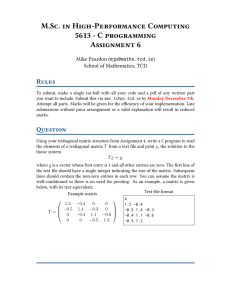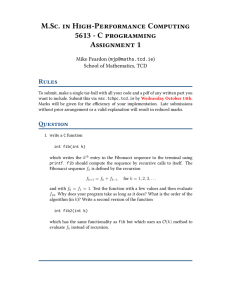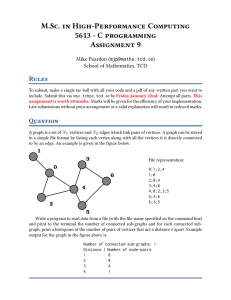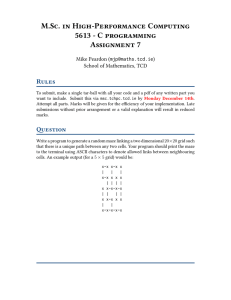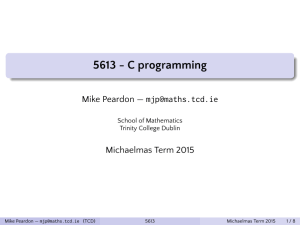5613 - C programming Mike Peardon — Michaelmas Term 2015 School of Mathematics
advertisement
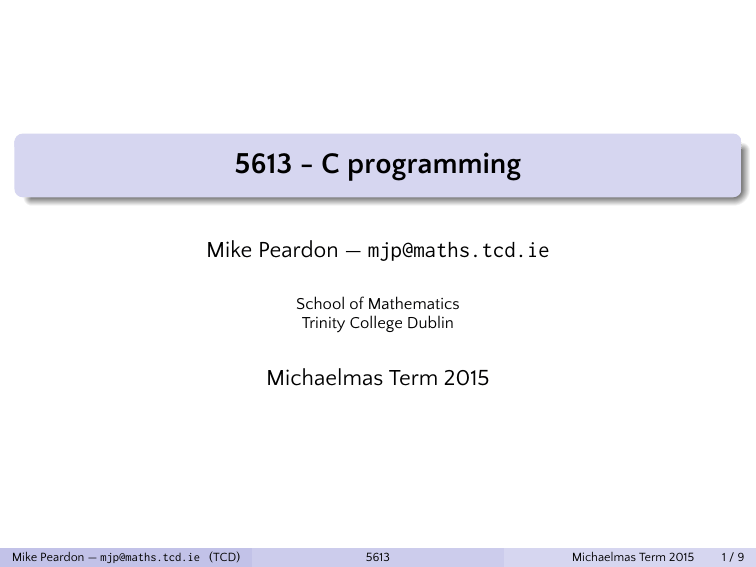
5613 - C programming
Mike Peardon — mjp@maths.tcd.ie
School of Mathematics
Trinity College Dublin
Michaelmas Term 2015
Mike Peardon — mjp@maths.tcd.ie (TCD)
5613
Michaelmas Term 2015
1/9
Addresses and pointers
Mike Peardon — mjp@maths.tcd.ie (TCD)
5613
Michaelmas Term 2015
2/9
& — find address of a variable
Accessible memory is addressable. C allows the address of a
variable (in scope) to be looked up using the & operator.
Memory addresses can be displayed via printf using the "%p"
format character:
int x=-125;
printf("address of x is %p\n",&x);
x
−125
0x8ae4 0x8ae8 0x8aec
Output would be 0x8ae4 - start address of storage location of the
variable.
Addresses can themselves be stored in variables called pointers.
Mike Peardon — mjp@maths.tcd.ie (TCD)
5613
Michaelmas Term 2015
3/9
Pointers
A variable name declared with ∗ preceeding it is a pointer to that
type.
int x=-125;
int ∗x_p = &x;
Memory required to store pointer is operating-system dependent
(e.g. 8 bytes on a 64-bit OS).
x
x_p
−125
0x8ae4
0x8ae4 0x8ae8 0x8aec
Need an ∗ in front of every name:
int∗ x,y; declares x as a pointer to an int, y as an int.
Mike Peardon — mjp@maths.tcd.ie (TCD)
5613
Michaelmas Term 2015
4/9
Dereferencing pointers
A pointer can be dereferenced using the ∗ operator. This looks up
the data in memory address and returns it as the original type.
int x=-125,y;
int ∗x_p = &x;
y = ∗x_p+50;
Here, ∗ x_p is an int, whose value is to be found at the memory
address pointed to by x_p, so y will be set to -75 in this example.
Operators for the data-type can be used. Examples:
∗x_p += 20;
(∗x_p)++;
Add 20 to int at address x_p
increment int at x_p
Pointers can also be compared to see if they address the same
location
if (x_p == y_p) { . . . }
Mike Peardon — mjp@maths.tcd.ie (TCD)
5613
Michaelmas Term 2015
5/9
Pointers as function arguments
Using pointers, functions can change variables in the scope of the
calling function.
void increment(int ∗x_p)
{
(∗x_p)++;
}
int main()
{
int x=456;
increment(&x);
printf("x=%d\n",x);
}
The function increment gets a copy of the memory address of the
main function’s local variable x loaded into x_p. The integer stored in
this address is then incremented so x changes.
Mike Peardon — mjp@maths.tcd.ie (TCD)
5613
Michaelmas Term 2015
6/9
Array names are pointers
After declaring an array such as int x[5], the array name x can be
used as a pointer to the start of the memory block used to store the
5 ints in the array.
x is equivalent to &(x[0])
The pointer derived from the name of an array can not be changed.
The array-name-as-pointer feature of the language explains how
called functions can change values within an array.
Can move along an array by incrementing a pointer
Mike Peardon — mjp@maths.tcd.ie (TCD)
5613
Michaelmas Term 2015
7/9
Pointer arithmetic
int main()
{
int x[] = {5,10,15};
int∗ x_p = x;
x_p++; ∗x_p += 2;
printf("%d %d %d\n",x[0],x[1],x[2]);
}
Output:
5 12 15
Pointer moves by size of the type pointed to (eg 4 bytes for int).
General addition/subtraction operations can be used (+,-,+=,-=).
Note difference between p++ (increment pointer p) and (∗p)++
(increment the data pointed to by p). Don’t use ∗p++!
Array lookup x[i] is equivalent to ∗(x+i)
Mike Peardon — mjp@maths.tcd.ie (TCD)
5613
Michaelmas Term 2015
8/9
Dynamical memory/array allocation
Can use pointers to allocate arrays in a more flexible way, using the
built-in function malloc to allocate memory dynamically (ie during
execution).
#include <stdlib.h>
void∗ malloc(size_t n)
Dynamic allocation: malloc take a single argument, the size of the
memory required in bytes and returns a pointer to a block of
memory with that size (or a null pointer if it fails).
The memory is not de-allocated automatically, even when the
pointer falls out of scope. Once your code has finished using the
memory, you should call the in-built void free(void *) function.
Repeated failures to return memory is called a memory leak.
Mike Peardon — mjp@maths.tcd.ie (TCD)
5613
Michaelmas Term 2015
9/9
